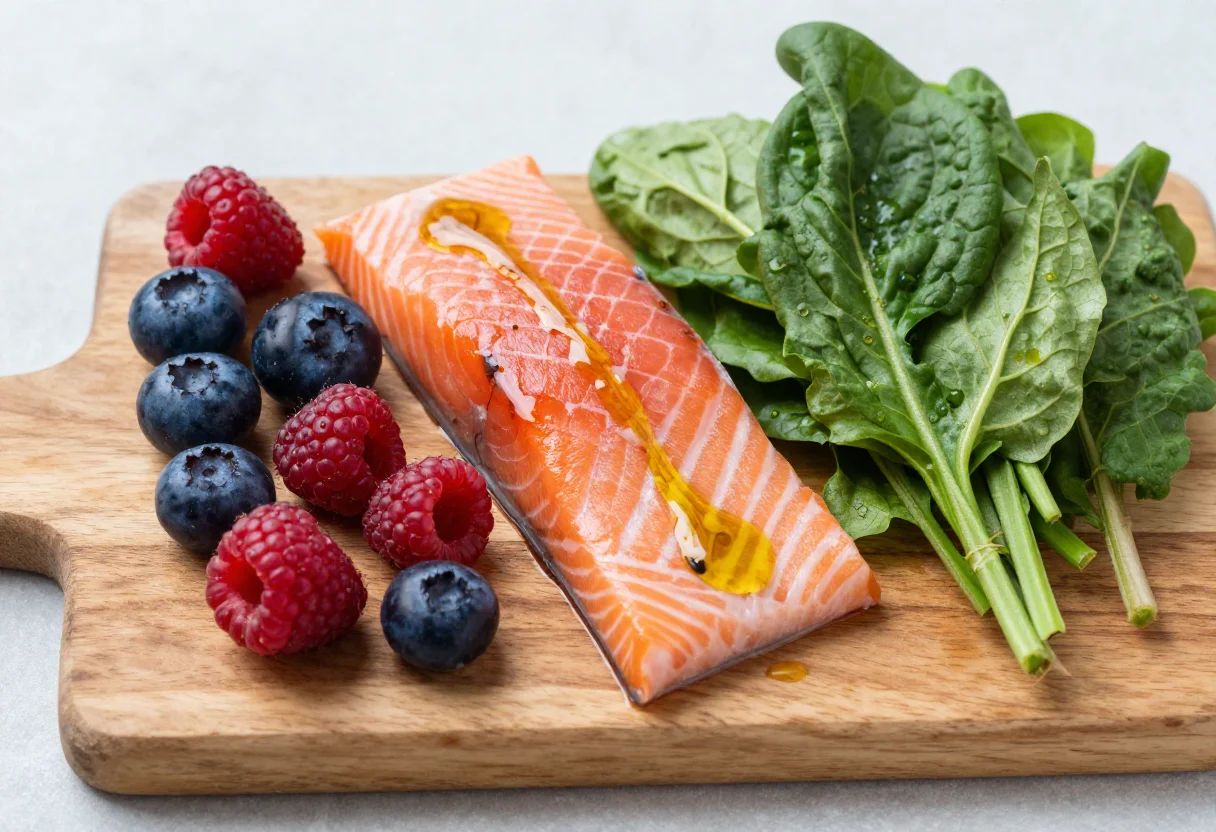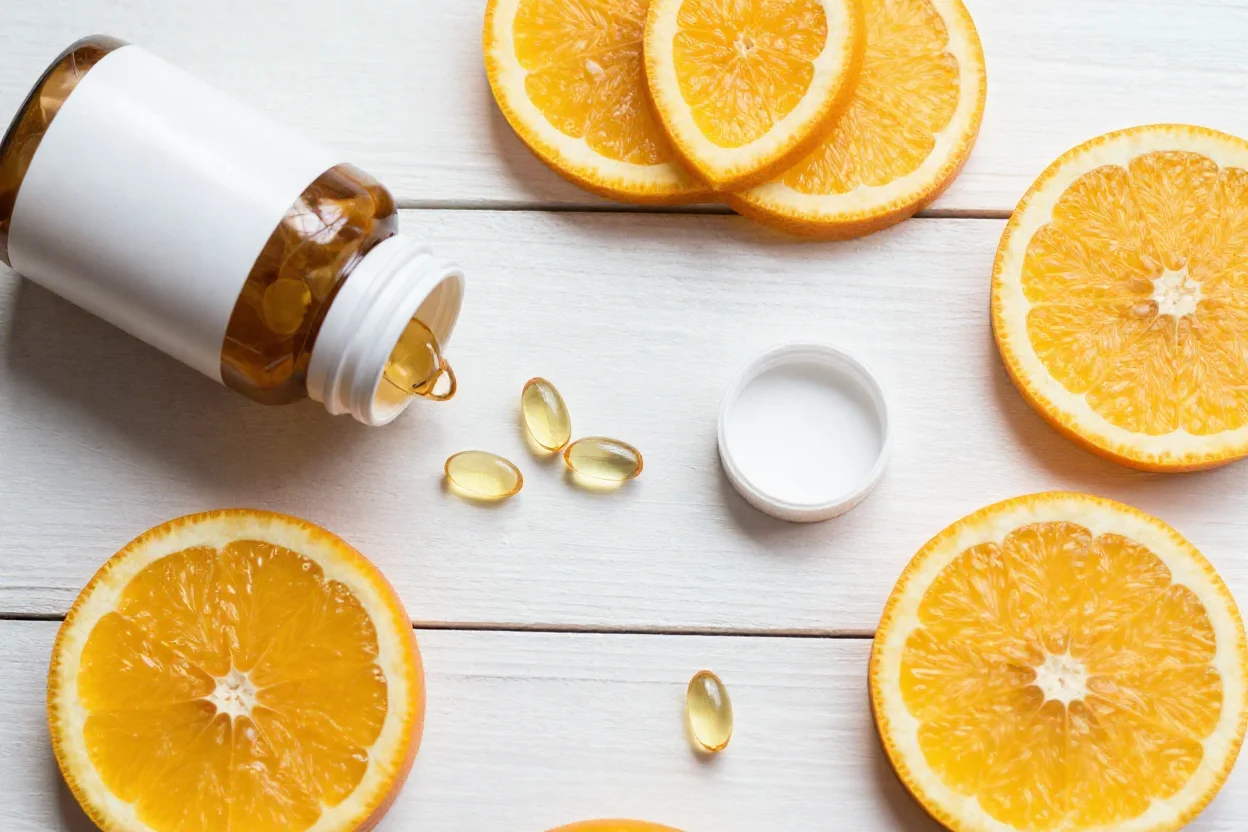
Lemon is a good source of vitamin C, which aids liver cleansing, and its acidity triggers the production of stomach acid needed to digest food, making it a standard fixture in most wellness practices. In addition, warm water prevents toxins from staying in the body, helps with bowel movements, and relaxes your digestive system while initiating your metabolism. This blend makes warm lemon water an easy and affordable method to start your day healthily, acting as a gentle wake-up call for your digestive system.
How to prepare it:
- Squeeze half a lemon into a cup of warm water (not hot).
- Take it first thing in the morning, before any other food or beverage.
Ginger has been used for centuries to relieve digestive issues such as nausea, bloating, and indigestion because of the anti-inflammatory properties of its active compounds, gingerol, and shogaol, that soothe the digestive tract and provide easy passage of food. Ginger soothes gut inflammation, remedies nausea and motion sickness, and is ideal for sipping after a heavy meal to avoid discomfort.
How to prepare It:
- Peel and slice a small piece of fresh ginger root.
- Boil in water for 5-10 minutes.
- Mix in a teaspoon of honey or lemon juice for extra flavor.
Peppermint is more than a breath freshener; it is a digestion powerhouse. Because of its menthol content, peppermint soothes the muscles of the digestive tract, inhibiting spasms and symptoms of bloating, gas, and irritable bowel syndrome (IBS). Because peppermint is caffeine-free, peppermint tea is invigorating and soothing for an upset stomach and a perfect bedtime drink for relief from digestion problems.
How to prepare it:
- Infuse peppermint leaves or a peppermint tea bag in boiling water for 5-7 minutes.
- Drink it slowly after meals.
Aloe vera is most famously associated with skincare, however, its usefulness doesn't stop there; when ingested, aloe vera juice calms the stomach and intestinal lining. Moreover, it is an excellent option for individuals who suffer from acid reflux or irritable bowel syndrome. It is a multifaceted, efficient solution for gut health because it contains enzymes that aid in the breakdown of sugars and fats, reduce GI tract inflammation, and repair the digestive tract lining.
How to use it:
- Mix 2-3 tablespoons of pure aloe vera juice with water or blend it into a smoothie.
- Take it 20-30 minutes before meals.
If you're interested in supplementing your gut microbiome, you might want to consider kefir. The fermented beverage contains probiotics, which are necessary for keeping your gut bacteria in balance. Kefir, by introducing beneficial microbes into your digestive system, may increase nutrient uptake, reduce bloating, and improve overall digestive functioning. And, with its tangy flavor, it's an effective and delicious way to give your gut-and immune system-a natural boost.
How to enjoy it:
- Drink a small glass of plain kefir as a snack or breakfast.
- Use as a base for smoothies or overnight oats.
Chamomile is often associated with a calming effect, but it is also an effective digestion supplement. Its natural anti-inflammatory compounds help in the relaxation of the muscles of the digestive tract, relieving cramps, gas, and indigestion in the stomach. Chamomile tea also treats bloating and promotes sleep-a less common element that is essential to gut health-making it the ideal drink to consume after meals for digestive comfort and quality sleep.
How to prepare it:
- Steep chamomile flowers or tea bag in boiling water for 5-10 minutes.
- Stir in honey to sweeten.
Pineapple is more than a tropical dessert—it's also a natural aid to digestion, due to an enzyme called bromelain, which can digest proteins and ease digestion by your body. As a bonus from its enzymatic activity, pineapple juice is also thirst-quenching, rich in vitamins, and anti-inflammatory in the intestines.
How to prepare it:
- Mix pieces of fresh pineapple into water and then filter the juice.
- Consume it in moderation to prevent excessive sugar.
Fennel seeds have served as a natural remedy for digestive discomfort, including bloating, cramps, and gas, for centuries. Infused in the form of warm tea, fennel is a gentle but powerful way of calming the muscles of the digestive system and stimulating the release of digestive enzymes. This soothing, caffeine-free drink not only relieves bloating and gas but also offers a natural means of gaining overall digestive comfort.
How to prepare it:
- Grind a teaspoon of fennel seeds and soak them in boiling water for 10 minutes.
- Strain and drink after meals.
Kombucha has gained fame not just for its sour, clean flavor but also due to its incredible probiotic benefits. As a fermented tea drink, kombucha is filled with good bacteria that aid in keeping the gut microbiome in balance, enhance digestion, and ensure overall gut health. It also helps with detoxification by promoting liver activity and flushing out toxins. Being a low-calorie, naturally effervescent beverage, kombucha is a tasty and healthy alternative to normal sodas and gives your digestive system the support it deserves.
How to enjoy it:
- Drink a moderate serving (4-6 ounces) as a mid-day drink to help refresh yourself, feel more energized, or improve your mood or focus.
- Choose low-sugar alternatives to derive maximum benefits.
One of the easiest and most effective ways to keep digestion healthy is to stay hydrated, and infused water adds flavor and functionality to plain H₂O. By adding ingredients such as cucumber and mint not only gives flavor but also introduces natural substances that are beneficial to the digestive system. Cucumber offers hydrating and anti-inflammatory properties, and mint soothes the stomach and helps alleviate bloating. This refreshing but simple beverage is an excellent means of maintaining hydration and facilitating digestive ease during the course of the day.
How to prepare it:
- Slice a cucumber and add a handful of fresh mint leaves to a pitcher of water.
- Let it infuse in the fridge for a few hours before drinking.
Apple cider vinegar is an effective digestive aid. It increases stomach acid levels, allowing food to be broken down more effectively. However, it should only be consumed in moderation to avoid irritation.
How to prepare it:
- Add 1 tablespoon of ACV to a glass of warm water.
- For better taste, add 1 teaspoon honey.
Alammar, N., et al. (2019). The impact of peppermint oil on the irritable bowel syndrome: A meta-analysis of the pooled clinical data. BMC Complementary Medicine and Therapies, 19(1), 21.https://doi.org/10.1186/s12906-018-2409-0
Azizi, N. F., et al. (2021). Kefir and its biological activities. Foods, 10(6), 1210. https://doi.org/10.3390/foods10061210
Bonvissuto, D. (2023). Health benefits of pineapple. WebMD. https://www.webmd.com/diet/ss/slideshow-health-benefits-pineapple
Choi, J., et al. (2022). Effects of ginger intake on chemotherapy-induced nausea and vomiting: A systematic review of randomized clinical trials. Nutrients, 14(23), 4982. https://doi.org/10.3390/nu14234982
Cook, D. (2022). Apple cider vinegar for digestion. What’s the deal? Canadian Digestive Health Foundation. https://cdhf.ca/en/apple-cider-vinegar-for-digestion-whats-the-deal/
Eternal Hospital. (n.d.). What to drink after a meal to help digestion. https://www.eternalhospital.com/title/what-to-drink-after-a-meal-to-help-digestion
Foster, M., Hunter, D., & Samman, S. (2011). Evaluation of the nutritional and metabolic effects of Aloe vera. In I. F. F. Benzie & S. Wachtel-Galor (Eds.), Herbal medicine: Biomolecular and clinical aspects (2nd ed.). CRC Press/Taylor & Francis. https://www.ncbi.nlm.nih.gov/books/NBK92765/
Goldman, R. (2023). 7 benefits of cucumber water: Stay hydrated and healthy. Healthline. https://www.healthline.com/health/food-nutrition/cucumber-water
Groves, M. (2023, March 10). 12 science-backed benefits of peppermint tea and extracts. Healthline. https://www.healthline.com/nutrition/peppermint-tea
Human Performance Resources by CHAMP. (n.d.). Kombucha: Benefits and risks. Uniformed Services University.
https://www.hprc-online.org/nutrition/performance-nutrition/kombucha-benefits-and-risks
Liu, H., et al. (2021). Effects of dietary fennel (Foeniculum vulgare Mill.) seed powder supplementation on growth performance, nutrient digestibility, small intestinal morphology, and carcass traits of broilers. PeerJ, 9, e10308. https://doi.org/10.7717/peerj.10308
McDermott, A. (2024). Ways your body benefits from lemon water. Healthline. https://www.healthline.com/health/food-nutrition/benefits-of-lemon-water
National Center for Complementary and Integrative Health. (2020). Ginger. U.S. Department of Health & Human Services. https://www.nccih.nih.gov/health/ginger
Nikkhah Bodagh, M.et al. (2019). Ginger in gastrointestinal disorders: A systematic review of clinical trials. Food Science & Nutrition, 7(1), 96–108. https://doi.org/10.1002/fsn3.807
Rosa, D. D., et al. (2017). Milk kefir: Nutritional, microbiological and health benefits. Nutrition Research Reviews, 30(1), 82–96. https://doi.org/10.1017/S0954422416000275
Srivastava, J. K., et al. (2010). Chamomile: A herbal medicine of the past with bright future. Molecular Medicine Reports, 3(6), 895–901. https://doi.org/10.3892/mmr.2010.377
West, H. (2024). 6 evidence-based health benefits of lemons. Healthline. https://www.healthline.com/nutrition/6-lemon-health-benefits















